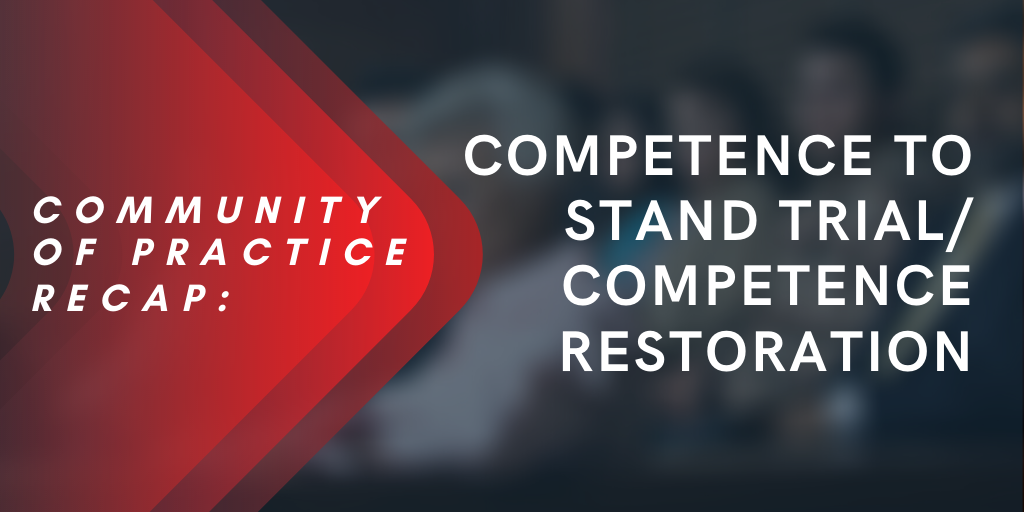Overview
SAMHSA’s GAINS Center’s Competence to Stand Trial/Competence Restoration Community of Practice (CST/CR CoP), now in its third year, was designed for state applicants, with a focus on legal, clinical, and systemic issues, including the demand for competence evaluations, evidence-based screening and assessment measures, waitlists for CR program beds, best practices for CR programs, partnership and collaboration development between state and local agencies, and other relevant issues.
The states that previously participated in 2019 were invited to continue working on their goals and sharing what they learned with the new states that joined this year as part of the 2020 CoP. California, Florida, Nebraska, Texas, and the District of Columbia decided to continue their work in the CST/CR CoP. Four new states also joined the CoP in 2020: New Hampshire, North Carolina, Oregon, and Utah. All participating states were offered the opportunity to develop strategic plans to address problems specific to their jurisdiction and identify methods for measuring outcomes. Each state participating in the CoP also identified and gained cooperation from one to three local communities to pilot the recommended changes.
Structure & COVID-19
As has been experienced by many organizations, the COVID-19 pandemic disrupted plans and resulted in a pivot to exclusively virtual technical assistance (TA) activities. A large component of the original CoP structure was the virtual meeting. This partially virtual, partially in-person 2-day meeting would have convened local sites with subject-matter experts (SMEs) to hold topical plenary sessions. This convening was restructured from the 2-day meeting into a series of virtual workshops spread across several weeks.
It is important to acknowledge the challenges that COVID-19 presented and continues to present to the states in having their teams meet and coalesce efforts around this issue. Many of the goals articulated in states’ applications will likely be set aside due to the devastating impact on state budgets.
Virtual Workshops
The virtual workshops were an opportunity for state teams to work directly with SMEs to accomplish their state’s objectives related to improving their CST/CR process. The workshops also offered a platform to engage with other states on the work they have been doing in this area. Workshop topics included CR, community readiness for diversion, data, community-based supports/treatment, jail diversion, and collaboration with justice stakeholders.
Topical Support
State teams were provided with tailored virtual TA opportunities, such as one-on-one calls with SMEs. TA topics included competence evaluation, CR, quality control of competence services, strategies for working with legislative partners to improve state laws for CST/CR, funding competence services, diversion of CST/CR populations across the Sequential Intercept Model, evidence-based community-based treatments for CST/CR, continuity of care, collaboration with justice partners, team development across justice and behavioral health systems, clinical concerns with CST/CR populations, and everything about data.
Virtual Strategic Planning Sessions
Six states opted to engage in a virtual strategic planning event with a facilitator provided by the GAINS Center. States were given the option of 2-, 4-, or 6-hour events, during which they developed strategic action plans that identified priority areas, defined strategies to eliminate gaps and overcome barriers to implementation of best practices, and identified measurable outcomes to promote improvements to the CST/CR practices and systems in their states/communities.
Accomplishments
The four states that were new to the CoP in 2020 have each reported several accomplishments:
- New Hampshire convened a productive strategic planning meeting with various statewide stakeholders, including competence evaluators, prosecutors, defense attorneys, mental health advocates, and treatment providers. As a result of the meeting, the team developed a written document outlining (1) New Hampshire’s restoration process to use for future meetings and (2) a renewed focus on New Hampshire’s need for legislative changes related to competence and restoration.
- North Carolina identified steps to develop community-based CR in one pilot community, identified community-based supports necessary for the implementation of this program, and identified an alternative model for forensic evaluations by learning what other states do.
- Oregon engaged a diverse team of stakeholders from across the state to design regional behavioral health centers, developed a three-phase strategic plan to move forward in developing regional behavioral health centers, completed Phase 1 of the strategic plan, and convened two pilot regions (one urban, one rural) to discuss additional plans for implementing the regional behavioral health centers in their areas.
- Utah expanded crisis services and supports to assist with community-based restoration and diversion from the justice system. It also developed a certification plan and training for forensic evaluators to improve quality and consistency in competence evaluations, a strategic plan to centralize the forensic evaluation system in Utah, and a court-ordered template for CR.
Five states continuing to participate from 2019 also made significant progress in 2020:
- California has implemented a forensic mental health diversion program in 24 counties.
- The District of Columbia worked with SMEs to improve the specificity of CR statutes and identify strategies to work with the judiciary and balance limited resources with the protection of defendants’ rights.
- Florida secured funding to develop a statewide community forensic liaison team.
- Nebraska worked on planning and designing an outpatient restoration program that will be implemented in 2021.
- Texas reached an agreement to create a forensic subplan to enhance its behavioral health strategic plan.
Conclusion
Despite the challenges posed as a result of the COVID-19 pandemic, all nine participating states made strides to increase community partnerships, collaborate with stakeholders, attend topical workshops, and move closer to the overall goal of improving the CST/CR process within their states and local communities. To further advance their work, the CST/CR CoP is continuing in 2021 and work with the 2021 cohort is ongoing.
Like what you’ve read? Sign up to receive the monthly GAINS eNews!


